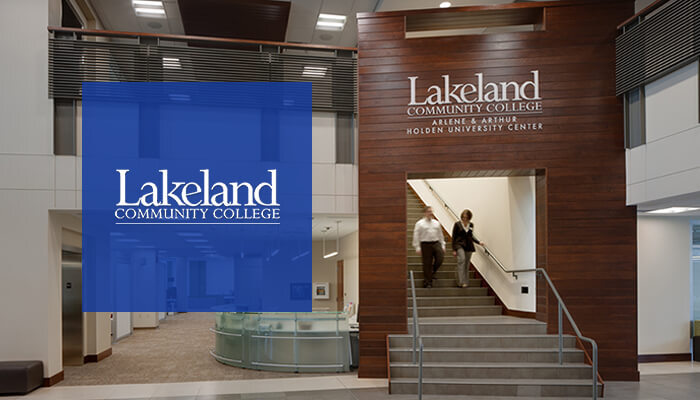
Course Insight Reveals Surprising Impact of FYE Course at Lakeland Community College
Share this Post
The Challenge: A preliminary analysis of early alert trends revealed that students were not performing well in Lakeland’s mandatory First Year Experience course.
The Strategy: First Year Course Advisory Committee looked deeper using course insights to better understand the course’s impact on persistence and graduation and identify potential opportunities to address barriers to student success.
The Outcomes: Results of the study sparked cross-functional strategic conversations aligning institutional policy and course curriculum to improve success throughout the student experience.
Retention leaders at Lakeland Community College, a mid-sized, two-year institution in Kirtland, Ohio, wanted to understand how their mandatory First Year Experience course influenced student success.
What they learned from their analysis was surprising. They discovered that students received many early alerts for poor performance in this course designed to support them.
By understanding how FYE impacts retention and graduation, leaders could see opportunities to adapt institutional policies and shift the course’s curriculum.
The Challenge: First Year Experience Yields Largest Volume of Early Alerts
Across campus, the First Year Experience (FYE) course had the highest number of early alerts submitted, surpassing quantitative and writing-intensive courses that traditionally challenge students.
Leaders were concerned that students struggled to engage with a course meant to support their academic success. The course—a widely accepted best practice in transition-to-college support—is designed to promote academic success and is taken by all new students at Lakeland. But many faculty-raised alerts indicated something wasn’t working as intended.
To further unpack the implications of this early alert study, the college’s First Year Experience Course Advisory Committee launched an investigation into the impact of the FYE curriculum on long-term student outcomes. They sought to leverage a diverse array of institution-specific insights. This would enable leaders and faculty to grasp how FYE impacts persistence and graduation rates, informing their decision-making regarding any necessary strategic changes.
The Strategy: Using Institution-Specific Insights to Reveal Barriers to Success
A deeper analysis of early alert trends revealed that 93% of students who received a high-level early alert in the FYE course either withdrew from the course or ended the semester with a grade of D or F. Of these students, only 44% persisted to the spring semester—further emphasizing that an intervention assumed to provide support was creating barriers to first-year student persistence.
Curious about the long-term impacts of FYE on student outcomes, leaders wondered how students who received alerts performed both within the term and over the course of their academic journey. They also wanted to know if different student populations experience the FYE course differently.
Leaders used the Course Insights capabilities within the Civitas Learning Student Impact Platform to uncover where student course performance impacts longer-term outcomes. More specifically – do poor grades in FYE link strongly to failure to graduate?

“I appreciate the user-friendly dashboards of the Civitas Learning Platform. It brings the data to life in a way that is easy for stakeholders to understand and for leaders to quickly and easily identify important trends.”
— Stephanie Brown,
Associate Provost for Institutional Research and College Registrar, Lakeland Community College
Course Insights revealed that those students who earned a D or F in the FYE only had a 3% likelihood of graduating compared to their peers. And a further investigation into the grade distribution uncovered that 13% of students who’ve taken FYE during the last ten years failed the course.
Further, leaders identified that Hispanic male and African American female students had poorer performance in FYE than other student populations. And overall, students performed better when the course was taken in person for the full semester instead of online or for shorter sessions within the semester
This analysis of FYE’s impacts on persistence and graduation provided important inputs for leaders by uncovering that students with poor outcomes in FYE are at higher long-term risk. With this insight, leaders and their teams are reevaluating course design and institutional policies such as course modality, curriculum, and offering the course pass/fail.
The Outcomes: Findings Spark Strategic Conversations to Improve the FYE
Lakeland faculty and administrators could have easily assumed that the FYE course benefited all students, considering it is a best practice in student support. However, Lakeland’s investigation into the course’s impact revealed a significant portion of students were not benefiting from the class. This discovery allowed leaders to begin developing practices to improve the efficacy of the FYE course.
Through their analysis, Lakeland gained important institution-specific insights they used to improve their FYE course to meet the unique needs of their students. Their analysis helped them to:
- Challenge assumptions about what’s working to support students.
Although a time-honored best practice, the FYE course in its current format wasn’t helping all of Lakeland’s students succeed. With this institution-specific knowledge, the First Year Experience Course Advisory Committee is now focusing on strategies to improve the effectiveness of the course.
- Identify opportunities to improve the FYE curriculum to serve students better.
Access to actionable analytics empowered Lakeland leaders to easily gain insights into the factors that impact students’ success in the course. This revealed opportunities to make quick adjustments to the course curriculum and textbook.
Designing Interventions that Work
Most importantly, their analysis has led the First Year Experience Course Advisory Committee to re-evaluate the purpose of the FYE course and its impact on student success. Recognizing that the primary purpose of the course is for students to find a sense of belonging and connection with the instructor and their peers, the Advisory Committee has begun redesigning the course to meet this objective.
In the challenging landscape of higher education, yesterday’s solutions are not always the answer to the challenges students face today. Lakeland’s experience speaks to the need for ongoing, institution-specific data analysis to gain insight into what challenges students face and how to adjust programs to support students at your institution. Understanding which combinations of strategies work enables cross-functional teams to align approaches to continuously improve outcomes for all students.


